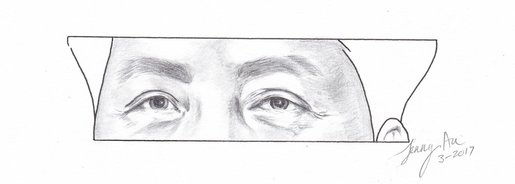|
KAI LIU Vol 11, Issue 3 The flash across the row of traffic lights catches my attention as we pass through into Haikou city. That’s odd I think to myself, A lot of people speeding today. It wasn’t until later that I found out that they were actually photographing every single car that drove through. For security reasons, I’m told.  Cartoon by Jenny Au Cartoon by Jenny Au The surveillance state in China is well advanced. From Beijing’s “天网” or ‘Sky Net’ (no I’m not making that up) reaching parity with London’s surveillance cameras, to the aforementioned flash of lights, to basically every service you own being connected to your “身份证“ or ID Card, chances are that if you’re in a big city in China, the government knows what you’re doing, or at least where you’re doing it. As an aside, the name ‘Sky Net’ is not derived from the Terminator movie series, but rather a reference to law, which descends like a net across the sky. Security in vulnerable points is tight. Before entering the subway, you must first pass a security check, complete with bag scanner. When foreign officials are visiting Beijing, entrance to Tiananmen Square is subject to security checks, and checking the contents of all sealed containers. Police will perform random checks of ID Cards at entrances to major subway stations. From what I could see in my short time there, people were unfazed by this. They complied with checks without protest. They presented ID Cards when asked. It’s not as though such heavy surveillance doesn’t have its advantages. Sky Net, Beijing Police tells us, helped catch over 2,370 suspects, and solved 1,500 cases in 2015. They trumpeted the triumph across State Owned media platforms. Those of us in the West immediately turn to the most devious of possible applications for the system. We are conditioned to; the CCP’s track record of human rights abuses leaves it little benefit of the doubt in Western circles. But as a personal matter, I have never felt more safe than when I was standing in the middle of Tiananmen Square, under the watchful eyes of police at designated checkpoints, and soldiers under every lamppost. That says something about me, rather than the Chinese surveillance state. I don’t want to create the impression that every Chinese city is blanketed with police and soldiers. Most of the time, you go about your business and see very few police on the streets. The vibrancy of modern Chinese society is unmuted by this surveillance. There’s an energy to Beijing that many Australian cities lack. “Employees wanted” signs abound everywhere. It is difficult, I am assured by a taxi driver, to be unemployed in Beijing. And the heavy hand of China’s government has positive aspects too. In the three cities that I visited, homeless people were rare, but street sweepers, each with a dustpan and brush, descend on the streets, cleaning up after the crowds that rush into and out of public transport every day. Their wages are paid by the local government. Peking University constructs its new buildings over the summer holidays to minimise disruption to students. It took Melbourne University years to remodel Arts West. China is building two wind turbines every hour. The country more than doubled their solar energy output in 2016, and reduced coal consumption by 1.6% from January to November, 2016. Still, the perennial question remains: to what extent is the security of the many worth the sacrifice of the rights of the few? The answer, I suspect, is different in China compared to the Western world that we are familiar with. Kai Lu is a third-year JD student The rest of this issue Comments are closed.
|
Archives
October 2022
|


